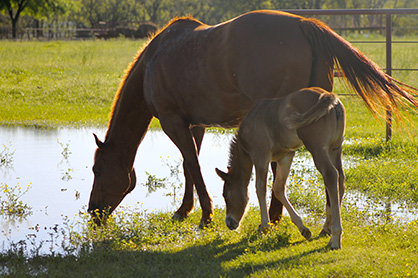
Nutritional Options for Boosting Your Horse’s Immune System
By: Joyce Harman
The immune system is behind all health issues. A healthy immune system reacts to the environment in appropriate ways, while an unhealthy immune system either overreacts or underreacts. Supplementation to improve or support immune function can stimulate or help regulate the immune reactions.
Healthy immune reactions include a high, short-lived fever in response to an acute disease. An unhealthy system mounts a low fever over a prolonged time. When treating an acute disease it is ideal to allow the fever to develop. Give some support if needed, but do not give anything that will reduce the fever, unless it is life threatening. Direct the treatment at strengthening or stimulating the immune system.
A healthy immune reaction to environmental compounds such as bugs and pollens is basically no external reaction. A normal immune system is routinely exposed to many compounds that it handles without any fanfare. An overreactive immune system produces many symptoms in the horse such as difficulty breathing, itchy, inflamed skin and diarrhea. Aim the treatment at regulating the immune system, not stimulating it.
Immune basics
The immune system is a complex molecular network with specific functions that defend the equine host against invading organisms. The body develops two types of immunity to protect itself: innate immunity and acquired immunity. Innate immunity resists invasion and infection by organisms and toxins while acquired immunity produces antigens against bacteria, viruses and other invaders.
Immune cells produce a variety of products that allow them to communicate with each other to aid in the response such as cytokines. Cytokines generally (although not always) act over short distances and short time spans and at low concentration. They bind to specific membrane receptors, which then signal the cell via second messengers to alter its behavior or gene expression of a cell.
The digestive tract has an important role in the immune system. Secretory IGA is produced along the gut wall and is a marker for the ability of the immune system to respond. Humans with low secretory IGA are difficult to treat. Although that test is not available for animals, some are poorly responsive to immune support and treatment while other much sicker animals respond well.
Aids to the immune system
Support for the immune system begins with restoring gut function through the use of pre- and probiotics, pH restoration, yeasts and amino acids such as l-glutamine.
Minerals are often coenzymes for immune function. Most horses are deficient in minerals. Selenium, deficient in many soils, is important due to its role in glutathione peroxidase, important for the development and expression of all white blood cells. Supplementation of 2-4 mg is commonly used. Zinc has a long list of important immune system functions and also inhibits the growth of several viruses. Zinc is particularly active in the immune functions of the eye and supplementation at 100mg per day is routinely used.
Natural sources of vitamin E are found in fresh green grass but decreases in stored hay. Its immune functions are well documented, and the doses recognized as beneficial to the equine are being raised. Currently 8000-12000 IU is used. Natural sources (d-tocopherol) have much better absorption than synthetic dl-tocopherol.
The essential fatty acids found in hemp, chia and flax support and regulate the immune system as well as help control weight. In humans, overweight people have presented with reduced immune function. The same is true to some extent with the horse. Any horse exhibiting skin lesions from allergies will improve significantly with fatty acid supplementation. Flax and hemp oil can be supplemented at a rate of 2-4 oz per day, or whole hemp, chia or flax seeds fed.
Vitamin C as ascorbic acid is an inexpensive immune system modulator that is well tolerated by almost all horses. It is usually fed at 4-5 gm per day.
Beta glucans derived from many mushrooms are excellent supporters of the immune system. They tend to be expensive, but some are willing to use mushroom extracts. The dosing is usually two to four times the human dose.
Conclusion
Consider support for the immune system where chronic disease is present. Evaluation of acute reactions in a clinical case can be informative about the health of the immune system. Use simple nutritional supplements for support and regulation.

Recently Added
- EC Photo of the Day – Gracie’s Beauty Salon April 18, 2025
- Orange Blossom Classic – Thursday, April 17 Featured Class Highlights April 18, 2025
- 2025 All American Quarter Horse Congress Schedule Released April 17, 2025
- The Equestrian Manor at WEC – Ocala Introduces Stunning New Venues and Restaurants This Fall April 17, 2025
- The Wedding Gift of a Lifetime April 17, 2025
- AQHA East Level 1 Championships Ride the Pattern Clinics April 17, 2025
- Around the Rings – 2025 Virginia Spring Breakout April 17, 2025
- EC Foal Photo of the Day- Meet Ollie! April 17, 2025
- Entry and Stall Proofing Lists Ready for 2025 AQHA West L1 Championships April 16, 2025
- More Around the Rings – 2025 Orange Blossom Classic & 2025 NCEA National Championship April 16, 2025
Archives
Sign In
Equine Chronicle ® All Rights Reserved. Copyright © 2025
4727 NW 80th Ave. • Ocala, FL 34482 • 352 369 1104 • FAX 352 369 1521
Privacy Policy | Questions, please contact The Equine Chronicle
-









